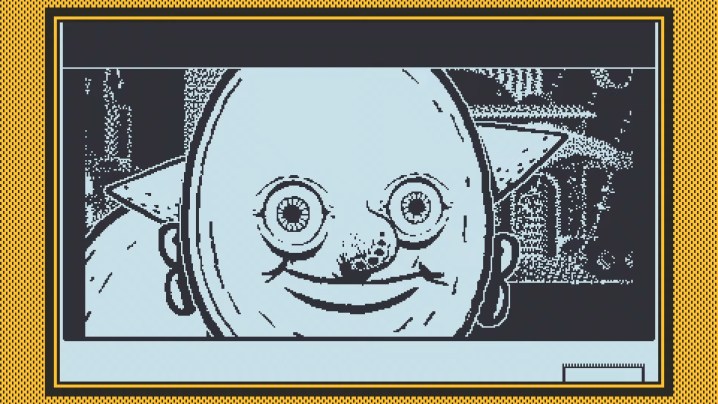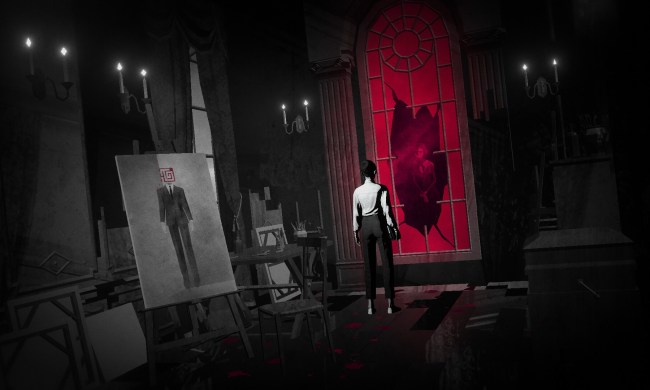
It’s only March and 2024 is already full of bold, big-budget games like Prince of Persia: The Lost Crown, Final Fantasy VII Rebirth, Like a Dragon: Infinite Wealth, and Dragon’s Dogma 2. But one of my favorite games of 2024 isn’t available on PC, PlayStation 5, Xbox Series X, or even Nintendo Switch. It’s Mars After Midnight, a game from Papers, Please and Return of the Obra Dinn developer Lucas Pope. The only place you can play it? On the Playdate, Panic’s quirky little 1-bit handheld with a crank.
Mars After Midnight is a more lighthearted game than Pope’s previous work. It follows an alien who dreams of coming to Earth and works to achieve that goal with his robot companion by moderating and serving as the bouncer for community events each night on Mars. Using the Playdate’s limited buttons and a crank, players must vet every alien creature that comes up to the door before deciding whether or not to let them in while also cleaning up after the aliens who eat the offered refreshments.
By using every inch of the Playdate’s display and almost all of the buttons on this small handheld, Mars After Midnight is a master class in getting the most out of the platform a game is made for. It’s innovative in that respect, and as I learned from speaking with Pope, that creativity comes from the constraints of making a game for Playdate. The platform forged a diamond under pressure.
1-bit wonder
Released in 2022, the Playdate is a handheld that harks back to the days of the Game Boy. It sports a small 1-bit display with no backlight and a crank on its side. The unique aspects of the device have attracted many developers to make games for the handheld, Pope included. “This is a weird way to play a game, but there’s so much cool stuff you can do with it,” Pope tells Digital Trends. “Coming off Obra Dinn, I was really burnt out, but something like Playdate seemed like a nice little playground to mess around in.”
When you’re really limited by what you can do, you have to think about problems that we don’t think about anymore.
Pope’s 2018 hit Return of the Obra Dinn is a first-person puzzle adventure game where players have to deduce how all the crew members on the titular ship died. It’s a remarkable game, but its 1-bit art style also helped it stand out. Pope tells me his infatuation with 1-bit visuals comes from his childhood days of playing with a Macintosh Plus, which fostered an appreciation of the unique visual design challenges. That interest provided the bridge from making Obra Dinn to wanting to create something for the Playdate.
“When you’re really limited by what you can do, you have to think about problems that we don’t think about anymore,” Pope says. “Just making objects stand out on backgrounds and making it so that when you scroll a background, it doesn’t flicker too much, there are lots of technical issues with making good 1-bit art that I really like working on.”

Mars After Midnight was birthed from those limitations, yet it’s one of the most visually and mechanically impressive games on the Playdate. Each alien I encounter is intricately detailed and often takes up the Playdate’s entire 400 x 240 screen, forcing me to use the D-pad to look around and get a full view of them. The size of that screen informed a lot about the game and its art.
“Once I got the physical Playdate and started playing with it, I realized the screen was beautiful, but it’s also really small,” Pope says. “That was the inspiration behind making the screen a window you’re looking at something bigger through … Part of the gameplay is moving your window around to see more, and I leaned into that the whole time by making these large character faces, using high contrast, and making them stand out on-screen.”
After opting for a narrative backbone intentionally more uplifting than his previous games, Pope set out to make a game with less friction than some of his last couple of games that felt wholly unique to the Playdate.
Life on Mars
The core gameplay loop of Mars After Midnight begins with me choosing what kind of session I’d like to hold at the community center that night, where to promote it, and what refreshments to serve. Some of the meetings have straightforward requirements for attendees. One is a support group for Cyclopes, while Gnat Knife Handling has me holding up a magnifying glass accessory to bugs that come up to the door so I can see if they’re holding a blade.

After taking care of those things, I begin the night. When I hear a knock on the door, I use the Playdate’s crank to open a window on it. It’s a basic interaction for the crank, yet one that’s instantly understandable for anyone who has ever used one to open something before. Through early testing with actual Playdate hardware, Pope found that the crank wasn’t rigid as it turned and that it was difficult to use the crank, D-pad, and buttons on the handheld all at once. Ultimately, he found that the mechanic where players use the crank to open a shutter on a door felt the most intuitive and physically satisfying.
When I’m done having fun opening and closing the window, I need to vet the people walking up to the door. I determine if they meet the requirements for the session that night. These tasks ran the gamut of every kind of interaction on the Playdate; I even have to press the system menu button for one so I can access a glossary of alien words and determine if secret agents are giving me the correct secret code. Pope tells me that Mars After Midnight wasn’t originally going to have those accessory-based vetting processes and that all meetings were purely based on visuals. In playtesting, he found they just weren’t that fun. Then he started making events like Gnat Knife Handling.
“That’s when the light bulb went off in my head,” Pope says. “I wanted more things like that, where you’re influencing the thing with some accessory, you’re doing something and interacting with them in a way that makes it a little more interesting.”

Letting people in isn’t the only thing I have to do in Mars After Midnight. Visitors also eat the refreshments I set up and mess up the table they’re on. I have to clean up that mess with something called the Soup-A Sweep-A in between my usual screenings. Pope tells me this idea emerged from the fact that he mentioned refreshments in some early art he made for the game. He thought looking at faces was “not much of a game,” so he added that element to Mars After Midnight to create a more engaging gameplay loop.
That’s the gist of Mars After Midnight. Night after night, I have to balance choosing who to let into meetings using a wide variety of event-specific accessories and mechanics, cleaning tables, and taking in its subtle narrative about how helping others ultimately helps you. Some of these interactions may sound simple, but the fact that they use every available Playdate feature is the beauty of Mars After Midnight.
Only on Playdate
Making games for the Playdate presents unique challenges. Pope emphasizes the importance of playing games on actual Playdate hardware, as that’s a much different visual experience than developing a game on a desktop screen. When he found that it wasn’t very comfortable to use the D-pad and crank at the same time, he designed the door-checking gameplay and the Soup-A Sweep-A so they wouldn’t interact with one another.

He didn’t make a difficult game because he felt that was more fitting for a small mobile platform like Playdate, where games should have more replay value. That again demonstrates how the design of Mars After Midnight shows a complete understanding of the platform it’s being made for. While the humor and event gimmicks keep me entertained, its intuitive design is what will stick with me long after I’ve beaten the game.
While console exclusives still exist, few games feel like they are designed just for the platform they’re launching on (aside from some DualSense-supporting PS5 games). I appreciate when games made for only one platform take advantage of their circumstance and fully commit to that. My favorite PS5 game is still Astro’s Playroom, and I can confidently say it will be hard for another Playdate game to dethrone Mars After Midnight as my favorite on Panic’s handheld.
ope used every button on this device to make a simple game about vetting people entering a meeting one of the most entertaining titles I’ve played in 2024. “Even though the D-pad and the buttons are great, and you can make lots of great games with just those, I really did want to make it so that there was a reason I put it on the Playdate,” he told me. After beating the game and speaking with him, I can say there was definitely a good reason for Mars After Midnight to be made only for Playdate.



